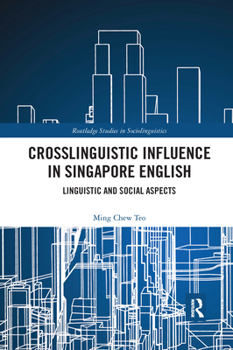Crosslinguistic Influence in Singapore English: Linguistic and Social Aspects
(Part of the Routledge Studies in Sociolinguistics Series)
Select Format
Select Condition 
Book Overview
In a social setting where speakers with several languages interact extensively, a major source of variation in Colloquial Singapore English comes from the complex interaction between crosslinguistic influences and various social and linguistic factors. By unifying both social and linguistic aspects of the phenomenon through the use of multivariate analyses like logistic regressions and Poisson regressions, this book represents a novel approach to the study of crosslinguistic influence in Colloquial Singapore English. As multivariate analyses provide us with information regarding the relative strengths of each social and linguistic factor, they are useful tools that allow us to have a more nuanced understanding of crosslinguistic influence in contact situations. Linguistic features from a variety of linguistic domains - morphology, semantics, and discourse - will be quantified, and statistical analyses will be run in R to determine the degree to which various social and linguistic factors affect the extent of crosslinguistic influence. Well-known Singlish features like the optionality of past tense and plural marking, the unique meanings of already, got, and one, and discourse particles lah, leh, and lor, are analyzed using this approach. The statistical modeling of these features is a first step towards creating a unified framework to understanding crosslinguistic influence.
Related Subjects
Language Arts




